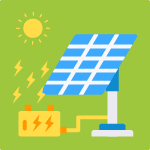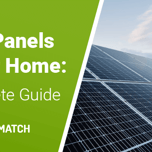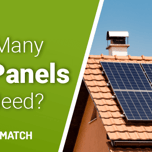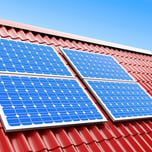
Get up to 4 quotes by filling in only 1 quick form

Slash your energy bills by installing solar panels

We’ve helped over 500,000 homeowners reduce their carbon footprint
- GreenMatch
- Solar Energy
- Solar Panels
- Commercial
Commercial Solar Panels
Why Use Solar Panels for Businesses?
Did you know that solar panels can reduce your business’ environmental footprint and save you money every year? Commercial solar panels can be beneficial regardless of whether your company is large or small.
Most businesses are active in the daytime, which means they are the perfect candidates for utilising solar panels. The energy produced by solar panels immediately flows out, unless you pair your solar array with solar batteries.
One of the key benefits is the substantial cost savings — even small businesses can save hundreds of pounds each year.
Over the 25-year lifetime of solar panels, this equates to thousands of pounds. If you operate industrial solar panels, you can sell excess energy to utility companies for a profit.
The benefits of solar panels for business go beyond practicality and saving money. By switching to commercial solar panels, you are also lowering your business’ carbon footprint.
This is based on the amount of greenhouse gases produced by your actions. Solar energy is renewable and carbon neutral. Switching would indicate your business’s commitment to green and sustainable practices.
If you are ready to make the switch to commercial solar panels for your business, GreenMatch can help you compare the best offers on the market. Fill in our form to receive up to four quotes from solar panel installers in your area. Our service is free and non-binding.
- Quotes from local engineers
- Payment by finance available
- Save up to £729 per year
It only takes 30 seconds



How Much Do Commercial Solar Panels Cost?
On average, commercial solar panels cost between £16,000-£70,000 for small to medium-sized businesses. There are several factors that influence the cost of solar panels, though, such as roof size, the amount of energy produced and the number used.
Begin by evaluating the cost to determine if solar panels are a feasible option for your business. To identify how much energy your company uses each month, take a closer look at your utility bill. It should indicate how much energy you use each month and how much the utility company charges you per kW.
Most small to medium-sized businesses use 30,000-50,000 kWh of electricity each year. Depending on where in the UK your business is located, your system size, and subsequently the costs, will differ.
A good rule of thumb with larger systems is to calculate approximately £1,000 per kW, plus VAT.
If you operate a very small business, you could get a price estimate by comparing the installation cost of solar panels and solar battery prices in the UK.
In addition, you may be eligible for tax reliefs if you have commercial solar panels installed. Though this is not possible for businesses that rely on solar energy for their revenue generation, such as solar farms.
A general breakdown of the cost of commercial solar panels can be seen below, excluding VAT.
| System size | Average cost |
|---|---|
| 10 kW | £9,500 + VAT |
| 20 kW | £18,200 + VAT |
| 40 kW | £35,000 + VAT |
| 50 kW | £44,000 + VAT |
| 60 kW | £51,000 + VAT |
What Are the Installation Costs?
When installing a solar panel system for your business, the main thing you are paying for is the panels and the inverters.
If you are installing a very large solar panel system, the installation costs may rise slightly if it takes a significant amount of time to carry out the installation.
A way to estimate the installation costs of commercial solar panels is to calculate £0.2p per watt fitted. That would mean it can cost approximately £2,000 (excl. VAT) to install a 10kW system. For large commercial systems, it may take multiple workers to install them, and the more people required, the higher the costs.
Once the initial installation costs are covered, though, there are very little additional costs.
Do You Need Planning Permissions?
In some situations, you may need to obtain planning permissions before installing commercial solar panels. In many cases, the contracting company that is completing the installation may be willing to sort out these permissions on your behalf.
Always ask before signing any contracts, so you know what to expect.
If your building or property site is designated as historical or part of a world heritage site, you will need to acquire permission.
If you are in doubt, we highly recommend consulting a professional solar panel installer. There are many qualified installation companies across the UK that we can easily connect you with. By filling in our 1-minute contact form, you can be connected with up to 3 different vetted installers.
Each installer will be able to help you with several things: (1) identify if you need planning permission, (2) provide you with a competitive quote tailored to your energy demands and (3) provide the installation of your new solar panel system.
Start getting offers from installers by clicking the button below.
- Quotes from local engineers
- Payment by finance available
- Save up to £729 per year
It only takes 30 seconds



What Maintenance Costs Are There?
The maintenance costs for solar panels are very low, which is one of the perks of buying commercial solar panels.
The installation of solar panels is the most complicated part of the process. Once installed, you only need to have a professional examine them every four to six years, therefore solar panel maintenance is very easy.
In general, solar panels require regular light cleaning to remove dust and debris. By keeping them clean, you ensure maximum efficiency. Depending on the setup complexity, you can lower costs by maintaining the system yourself throughout the year.
Solar panels on commercial buildings may be too high to reach, so consider hiring a professional cleaner if necessary.

Grants for Solar Panels on Commercial Buildings
Currently, the United Kingdom does not offer government grants for solar panels on commercial buildings.
Applications for the Feed-in Tariff scheme closed in March of 2019. However, new funding opportunities may arise as the UK works toward lowering emissions and reducing fossil fuel reliance.
The Smart Export Guarantee (SEG) took effect in January 2020, and businesses can potentially experience financial gain from exporting excess energy back to the national grid. To be eligible, you must have a smart meter to measure the power exported.
There are also some solar panel funding opportunities if you are in the public sector. Salix Funding, for example, provides interest-free capital for energy-efficient technologies. Salix is owned by Governments: it’s funded by the Department of Business, Energy and Industrial Strategy (BEIS), the Scottish government, the Welsh government, and the Department for Education.
Financial Savings
The SEG allows suppliers to set the price for the energy they purchase. According to the legislation, rates can be flexible or fixed, so long as they are above zero.
While these rates may vary, expect for them to mimic wholesale and market prices. This could equate to a sizable profit from the excess energy exported from your solar panels.
What Are the Benefits of Commercial Solar PV?
There are many advantages of solar energy, such as cost, efficiency, and income potential. Below, we break down the 3 key advantages of using solar panels for your business.
1. Reduced Utility Costs

Energy from commercial solar PV will cost a fraction of what you were paying from a utility company. While saving only a few pence per kWh sounds small, it adds up quickly.
Additionally, solar panel maintenance cost in the UK is relatively low. Therefore, you can enjoy reduced overall expenses for your electricity consumption.
2. Efficient Energy Production

Commercial solar panels can make your day-to-day operations more efficient. Standard solar panel efficiency levels are 15-20%, but they can reach 42% in some cases.
Commercial rooftop solar panels are not all created from the same material and therefore have different efficiency ratings.
Monocrystalline solar panels are made from one silicon piece and are known for being the most efficient solar panel material on the market. As such, they are also the most expensive.
However, large solar panels made from this material will perform better in low sunlight levels than polycrystalline panels.
Several pieces of silicon are melted together to produce polycrystalline panels. These are easier to create, which makes them less expensive. While less effective at saving space, these panels still operate with 13-16% efficiency.
Thin-film solar panels are another popular option that requires even less material. These panels are the cheapest to manufacture, but they also have low energy efficiency, requiring the most space.
When evaluating commercial solar panel efficiency, remember to examine the materials used in manufacturing.
3. Tax Relief and Additional Income Potential

The added income potential is a major benefit of solar panels for businesses. Despite the change in exporting rates, the SEG still allows business owners to gain an additional revenue stream while slashing their electric bills.
As some suppliers are offering rates similar to FIT, you still have the potential to passively earn hundreds of pounds with your solar panel investment each year.
In addition, tax reliefs can make investing in a photovoltaic system even more attractive.
What Are the Main Disadvantages?
As with most things, commercial solar installation has its disadvantages. While drawbacks can arise due to the solar panel installation companies, the shortcomings addressed below relate to commercial solar PV systems in general.
1. High Initial Investment

One of the most prominent disadvantages is the high initial investment cost. When you buy commercial solar panels, you know you’ll see a high return on investment (ROI), but that can take years. In the meantime, you’ll be responsible for the out-of-pocket expenses.
However, it’s valuable to know that solar panels for business premises typically break-even much sooner than residential systems because of their ability to generate much more power.
2. Weather Dependency

All solar panels are weather dependent as the photovoltaic effect converts energy from the sun. When there is poor weather with clouds, snowfall or extreme heat, the solar panel efficiency will decrease.
This disadvantage can make your energy conversion inconsistent during certain times of the year. However, solar panels will still produce energy with indirect sunlight or in the winter months, so they will still work.

What Are the Best Solar Panel Companies?
There are various factors to consider when choosing the best solar panel companies. Criteria should include the type, power, efficiency, power tolerance, size, and product warranty.
After examining the details, six of the best companies include:
It can be overwhelming to compare solar panels across all the available manufacturers in the UK. Luckily, you don’t have to spend hours researching this. With GreenMatch, getting commercial solar panels is simple.
By filling in our 1-minute form, we’ll connect you with up to 3 different professional installation companies that offer both tailored advice and quotes. This way you’re able to compare the different advice and quotes to choose the best deal for you.
This service is completely free and comes with no obligations. Get started with our contact form by clicking the button below.
- Quotes from local engineers
- Payment by finance available
- Save up to £729 per year
It only takes 30 seconds



FAQs about Industrial Solar Panels

Emily is a freelance environmental writer who writes on renewable energy, green technology and sustainability. To read more of her writing, you can visit her blog, Conservation Folks, or follow her on Twitter @EmilySFolk
 We strive to connect our customers with the right product and supplier. Would you like to be part of GreenMatch?
We strive to connect our customers with the right product and supplier. Would you like to be part of GreenMatch? 









